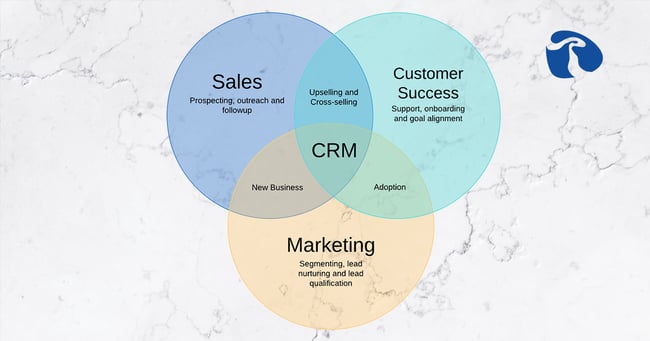
Before we get in to whether or not you should be including account-based sales into your planning, let’s take a step back and dig into what it actually is.
To put it bluntly, an account-based framework treats every account like an individual market. Instead of one salesperson targeting one stakeholder in a company, account-based selling targets multiple stakeholders in a company and frames the conversations through the lens of their pain points. It’s about understanding complicated company wide issues and finding solutions, which alleviate everyone’s needs.
How does it work with account-based marketing?
Account-based selling and marketing are both part of the account-based framework. An account-based framework is a multi-channel, high touch communication strategy which requires coordination from sales, business development, marketing and customer success to serve high-value accounts. The accounts tend to be long term and multifaceted meaning everyone managing the relationship with the account needs to be closely aligned on client needs and expectations. The nature of these types of accounts also means there should be upsell and cross-sell opportunities driving up their life time value.
While that’s all well and good it doesn’t really get into the “how” when it comes to bringing it all together. So let’s look at different areas of the account-based framework to see how this all works.
Account-Based Selling
One of the main differences between a traditional transactional sales and account-based selling is what happens after the initial sale. In the account-based framework, sales will continue to follow the account, looking for revenue expansion opportunities.
This doesn’t mean sale people are constantly selling to the client. Being pushy and selling things the client doesn’t need is a great way to increase churn. Rather, sales will keep relationships warm, follow how the client is being served and listen to feedback. If an opportunity arises for the sales person to propose something extra that will help the client achieve their goals, they proactively move on it.
Modern sales systems help a great deal because they can passively monitor the client relationship. When certain activities happen on the marketing or customer success fronts, they can signal to the sales person that there is an upsell or cross-sell opportunity.
If you are selling to enterprise clients, you might already be using account-based selling.
Account-Based Marketing
If you follow the Five-Ds of account-based marketing you will need to do the following:
- Define accounts by creating ideal customer profiles based on clients which are showing the highest lifetime value, because of expansion revenue.
- Derive focused insights based on the pain points those accounts need to have addressed and can be solved by your companies offering.
- Divide, contextualize, and conquer by segmenting similar accounts into buckets that can have templated approach with semi personalized communications.
- Drive account growth by helping with a “land and expand” approach. This generally means getting your foot in the door with a more targeted project, solidify the relationship by delivering promised results and then leverage that relationship to reach out to other areas of the client’s organization.
- Distill repeatable or refreshable action items by measuring and reporting on effectiveness within specific accounts. Zero in on successful approaches and lean into them.
As you can see, there is overlap with what sales would be doing in an account-based approach. Both marketing and sales follow the account post sale, both look to build on client relationships, both look for expansion opportunities, and both seek to target the pain points of the client to continually provide solutions that will help the client achieve their goals. For this to work, both marketing and sales need to be closely aligned. Otherwise they get in each other’s way.
Account-Based Customer Success
We can’t talk about account-based customer success without first clarifying what we mean by customer success. True customer success models put the client in the center and try to align client goals and expectations. They are the vessel in which fulfillment teams deliver their solutions and where clients provide feedback on whether or not they are working.
Account-based customer success takes the role of customer success managers one step farther and demands they follow the ripple effect their relationship has across the entire account. Sure, they will be in contact with power users, or implementation champions, but the account-based framework demands they foster a relationship with other areas. Areas that are involved in decision making, the approval process or just impacted by the solution. Customer success teams need to know all the players in a client account so they can help navigate bureaucracy, avoid unintended consequences and see gaps that might impact the overall success of the relationship.

Tying it all together
To successfully pull together an account-based framework, interdepartmental communication is the name of the game. The best way to get everyone on the same page today is to use a customer relationship management (CRM) system which unifies all communication and activities at the account level. Status of deals, client interaction with digital content, service tickets, communication activities and much more need to be transparent to all.
Here is an example of this all working together from my career.
I have changed the details for the sake of confidentiality..
My sales team had just successfully signed a new client which is the IT department of a large enterprise company. The client is moving their corporate systems to the cloud. The scope is to simply take the existing system and move it off the physical servers at the company headquarters to cloud datacenters. With everything signed, sales handed the project off to the customer success team to manage onboarding and project execution.
Customer success starts their due diligence, which includes team interviews, and conversations with department heads outside the IT department. In their conversations they spoke with the clients legal team’s executive who express his frustration with how document versioning and approval is handled on the current system. The customer success team mentions they might be able to help and flags the opportunity in the CRM. Doing so triggers a marketing email explaining how document management can be handled in the cloud.
The sales rep on the account also got notified and sees that the opportunity has been identified. The CRM also shows that the prospect has clicked the email. This is enough for this sales rep to reach out to the contact on the account. Because everyone is on the same page, the contact has all their information in the CRM because of the customer success team. On the sales call, the sales person identifies a real opportunity and creates a new deal, a proposal, and eventually a closed won cross-sell.
So should an account-based selling framework be part of your 2020 plan?
Unfortunately I can’t give you a simple yes or no. What I can do however is give you a list of things to consider:
- Do you typically sell to large corporate clients?
- Is your service or product offering multifaceted and able to solve for many different types of problems?
- Is your sales team missing upsell and cross-sell opportunities?
- Are you ready to adopt a CRM system that aligns information across departments?
If you answered yes to all these items then your answer is yes. An account-based framework will help you grow relationships with your clients and can increase their lifetime value.
Do you want to look into this now? Like, right now? No problem!
Reach out to us in the chat and we can evaluate what it would take for your company to implement an account-based framework.